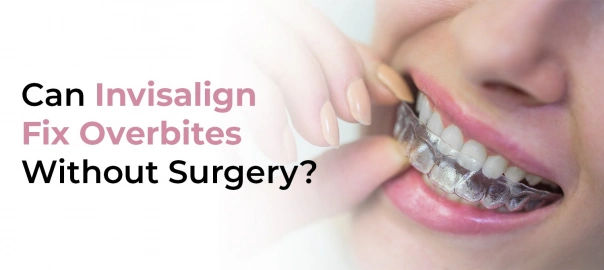
Can Invisalign Fix Overbites Without Surgery?
Introduction
Before getting into specifics, first let’s try and understand what an overbite is? Overbite is a condition in which the upper teeth extend too far past the lower teeth. It might sound as a cosmetic concern, but it leads to the loss of structural balance and harmony of the oral cavity.
For decades, metal braces ruled bite correction, but now people are opting for comfort. Invisalign aligners have offered them a much more discrete and comfortable treatment option. But the question remains the same. Does Invisalign really fix overbites without the need for surgery?
The Power of Invisalign:
Since gaining FDA approval in 1988 Invisalign has emerged as a reliable treatment alternative . It has become a popular alternative to traditional braces. It uses a series of custom-made, removable clear plastic aligners to shift teeth. The material makes the aligner virtually invisible. It comes with the flexibility of being removable, thus allowing it to be taken off for eating and brushing.
Correcting Overbites with Invisalign:
According to a 2017 research, Invisalign has been proven successful in treating mild to moderate overbite cases. The working mechanism of aligners is application of gentle yet consistent pressure. This sort of pressure gradually moves the tooth into the desired position over time. Your orthodontist will switch you to a new set of aligners every few weeks, each set of aligners planned to focus on a particular treatment phase.
Treatment Duration:
The treatment duration for Invisalign is dependent upon the severity of overbite as well as the individual. On an average it ranges between 6 months to 2 years. But if there is inconsistency with its usage, the treatment period may extend further.
Age and Jawbone Flexibility:
Another factor affecting the duration of Invisalign treatment is age. Younger patients have flexible jawbones that are still growing, allowing easier tooth movement. While for Adults, the growth of jawbones is complete, thus requiring a longer treatment time.
Severe Overbites and Braces:
It is well established that Invisalign is effective for mild to moderate overbites. But for severe cases, traditional braces tend to be the treatment of choice. Braces give better control for precision when handling complex dental cases. The Orthodontist will check the severity of overbite, to plan for treatment options ahead.
Retainers and Maintaining Your New Smile:
Post treatment completion, you’ll be required to wear a retainer to ensure the teeth stay as aligned. Retainers anchor teeth in their new positions, giving jawbone time to regain bone tissues. The duration for which it needs to be worn is determined by your Orthodontist.
Conclusion
In conclusion, Invisalign is an effective method in treating mild to moderate cases, without the need for surgery. While for severe cases, traditional braces may be the more appropriate solution. If you’re considering treatment for an overbite, it’s essential to consult with an Orthodontist who evaluates and recommends the best course of action for achieving a healthy, beautiful smile.
Leave a Reply
Leave a Reply
Explore More Similar Posts
Explore More Blogs


Leave a Reply